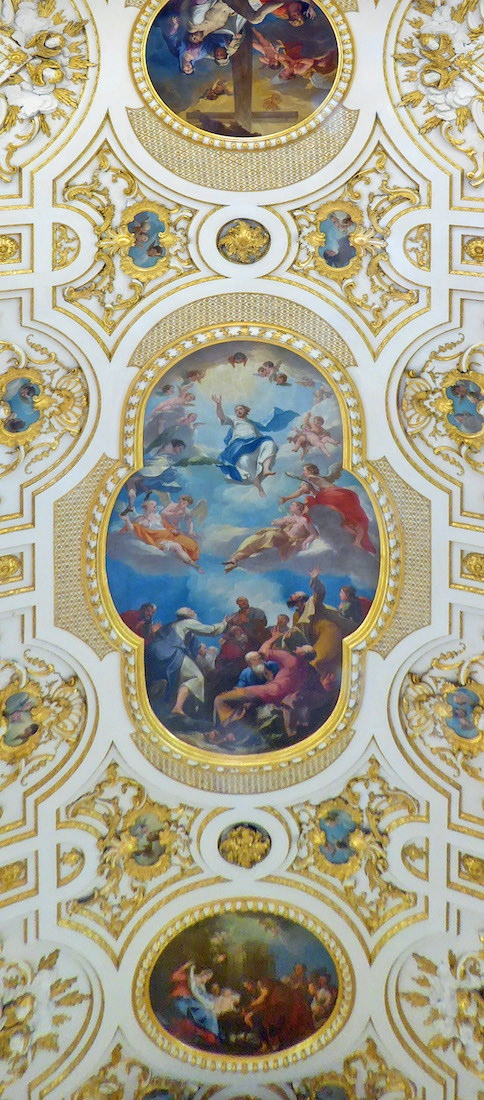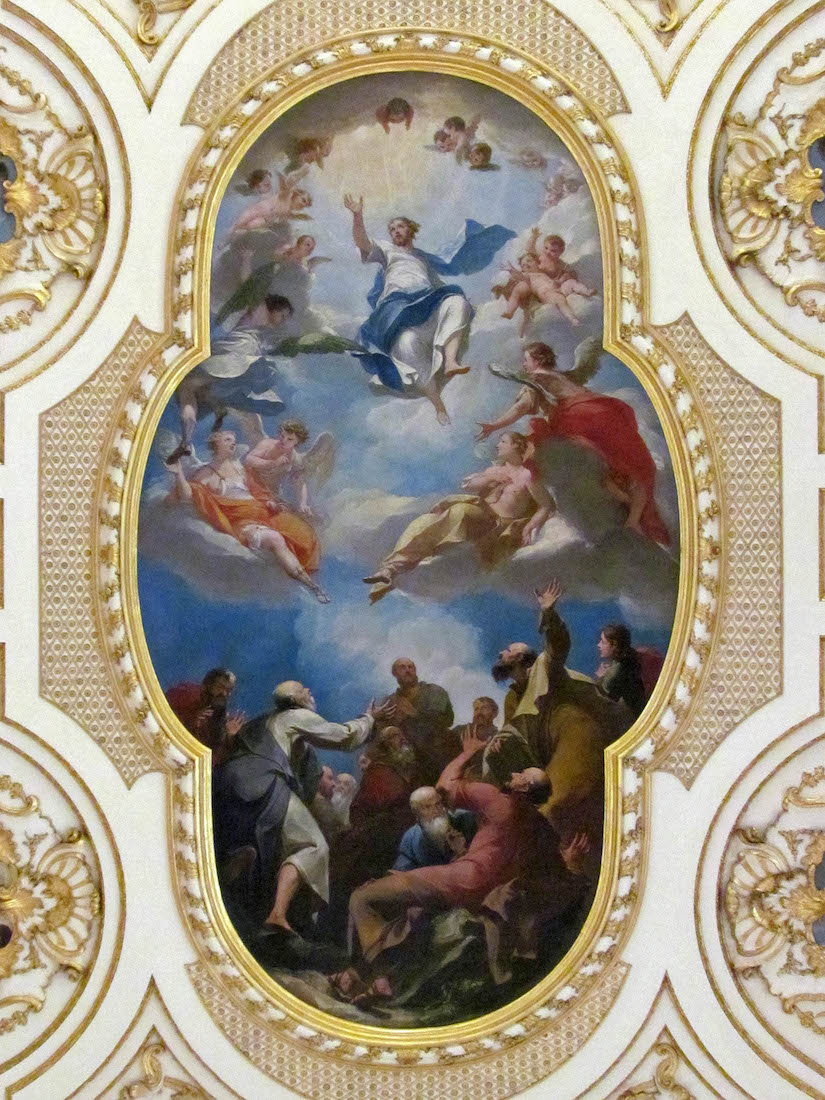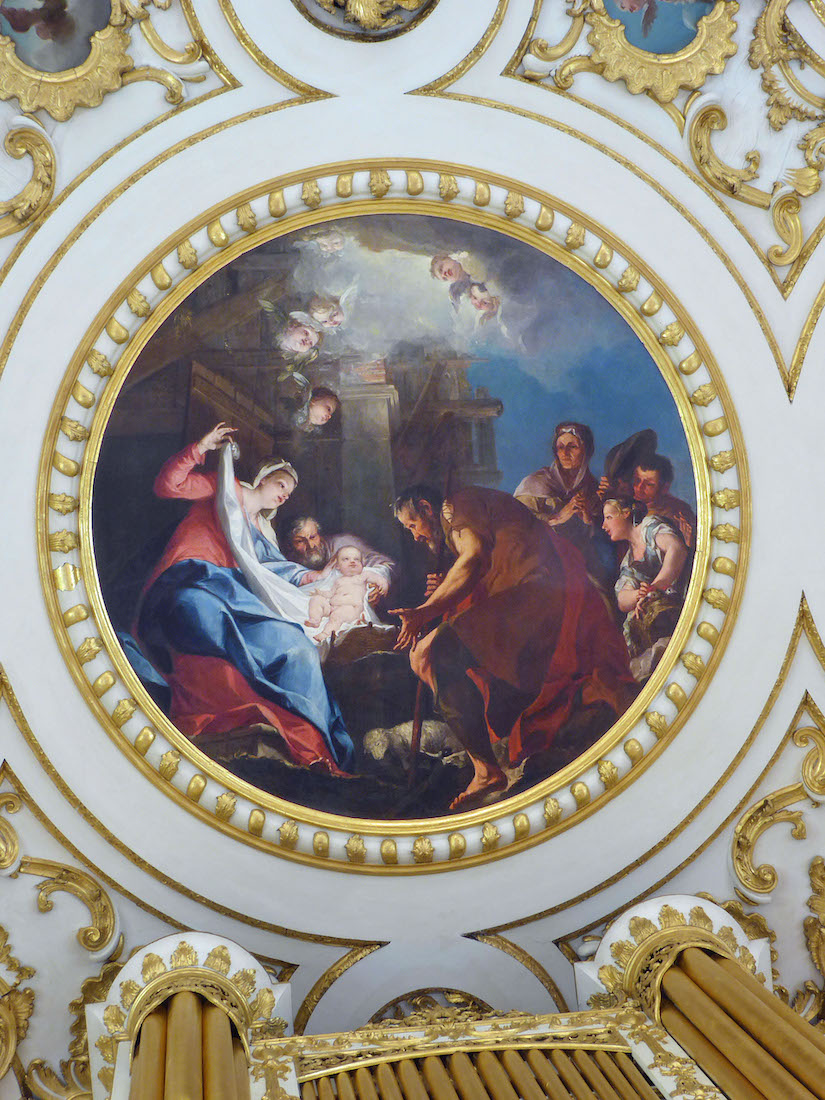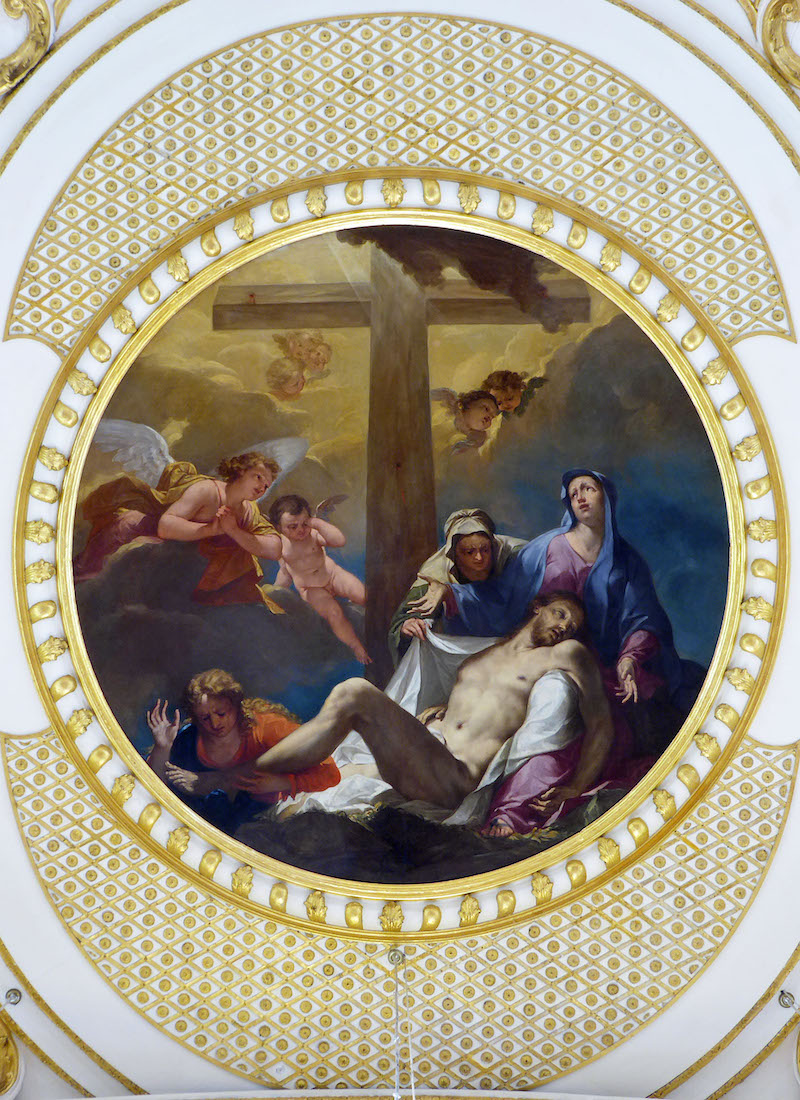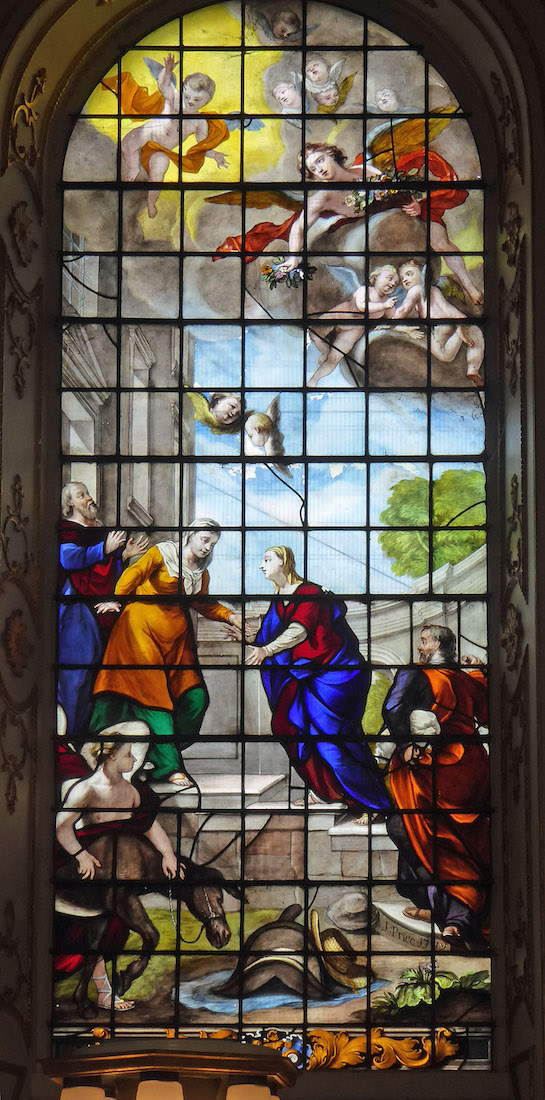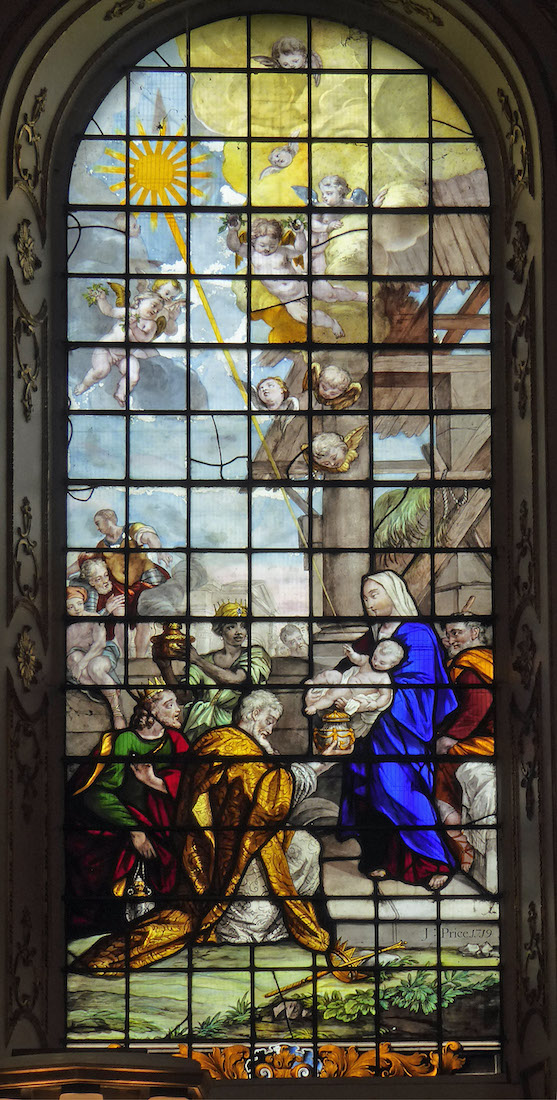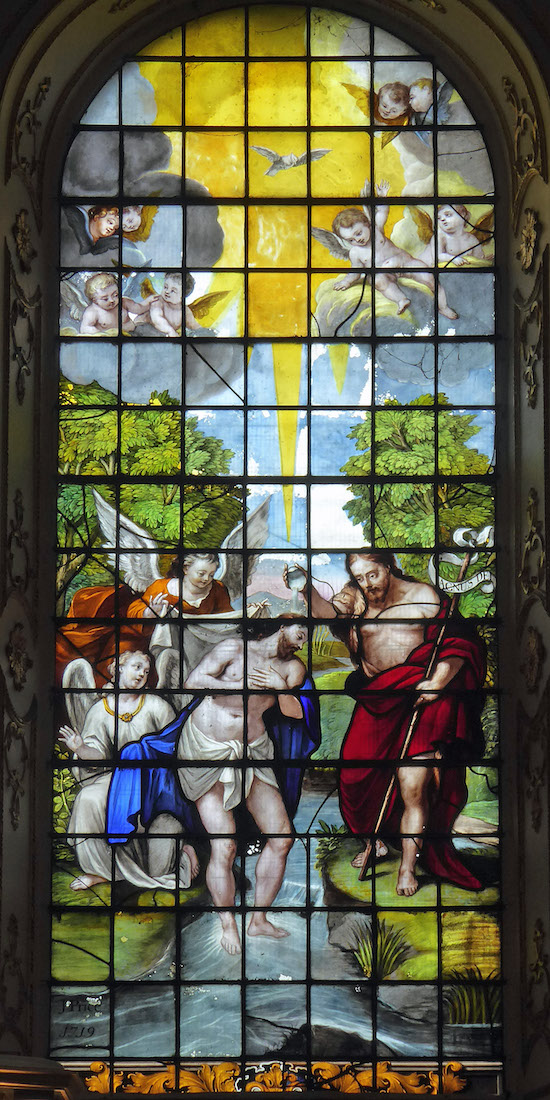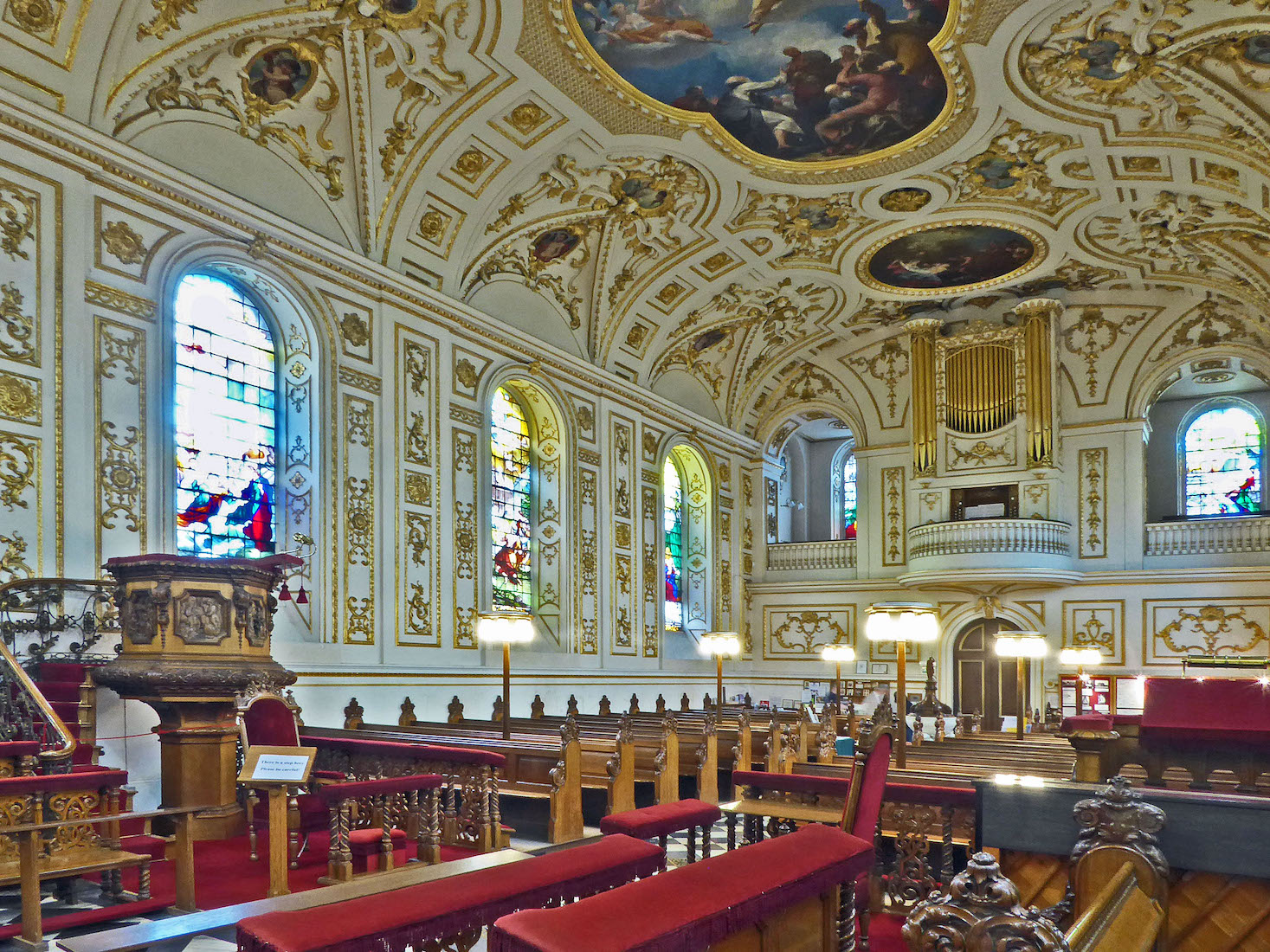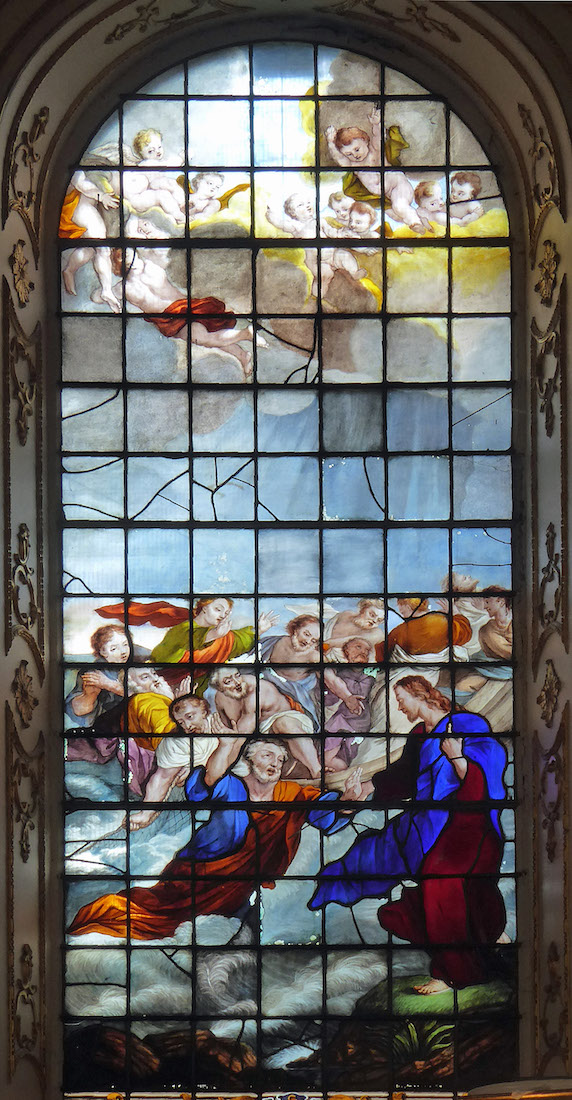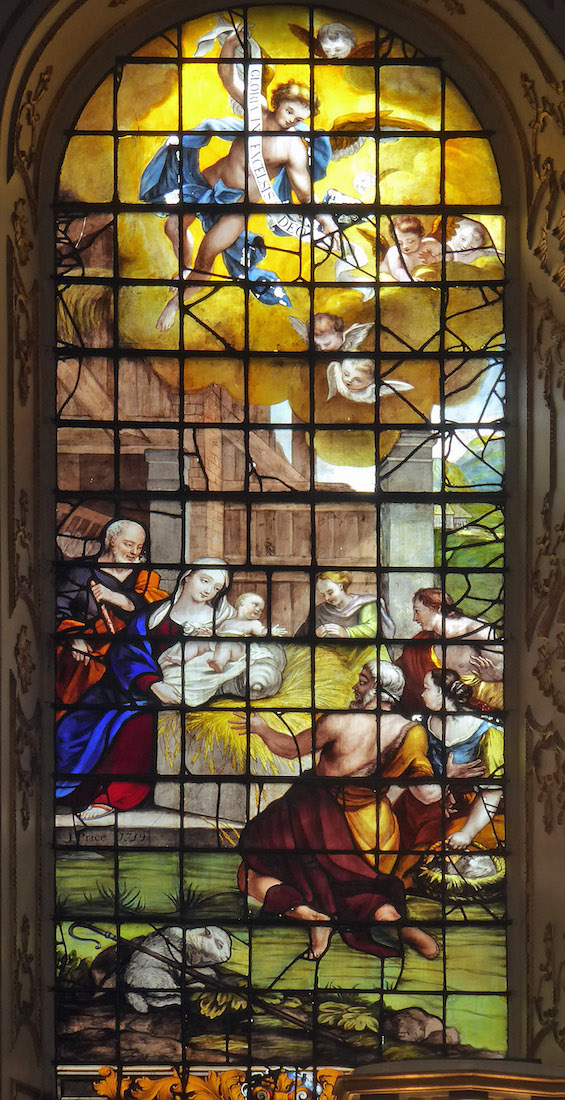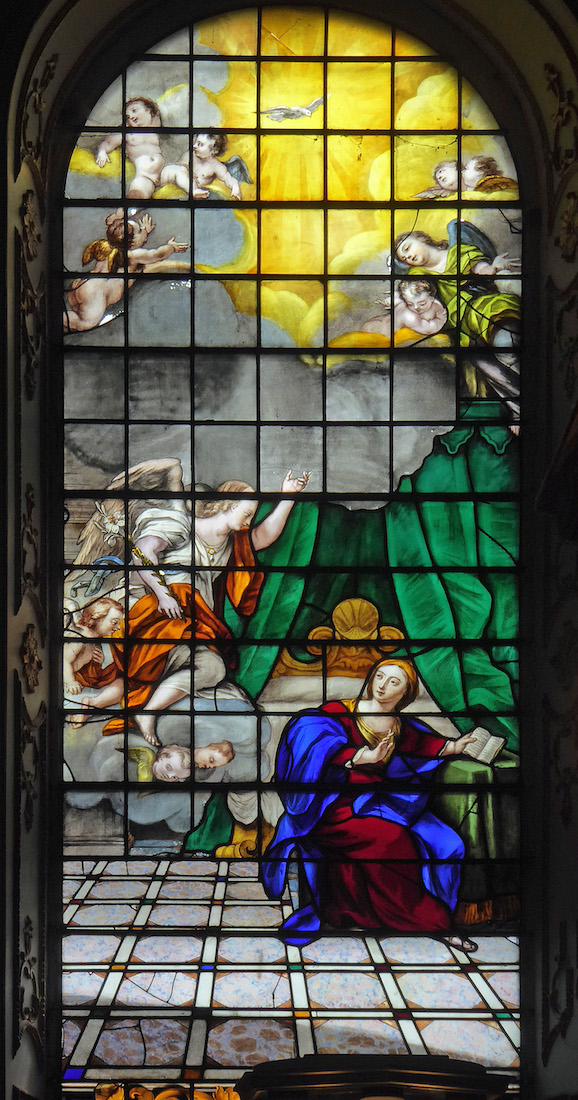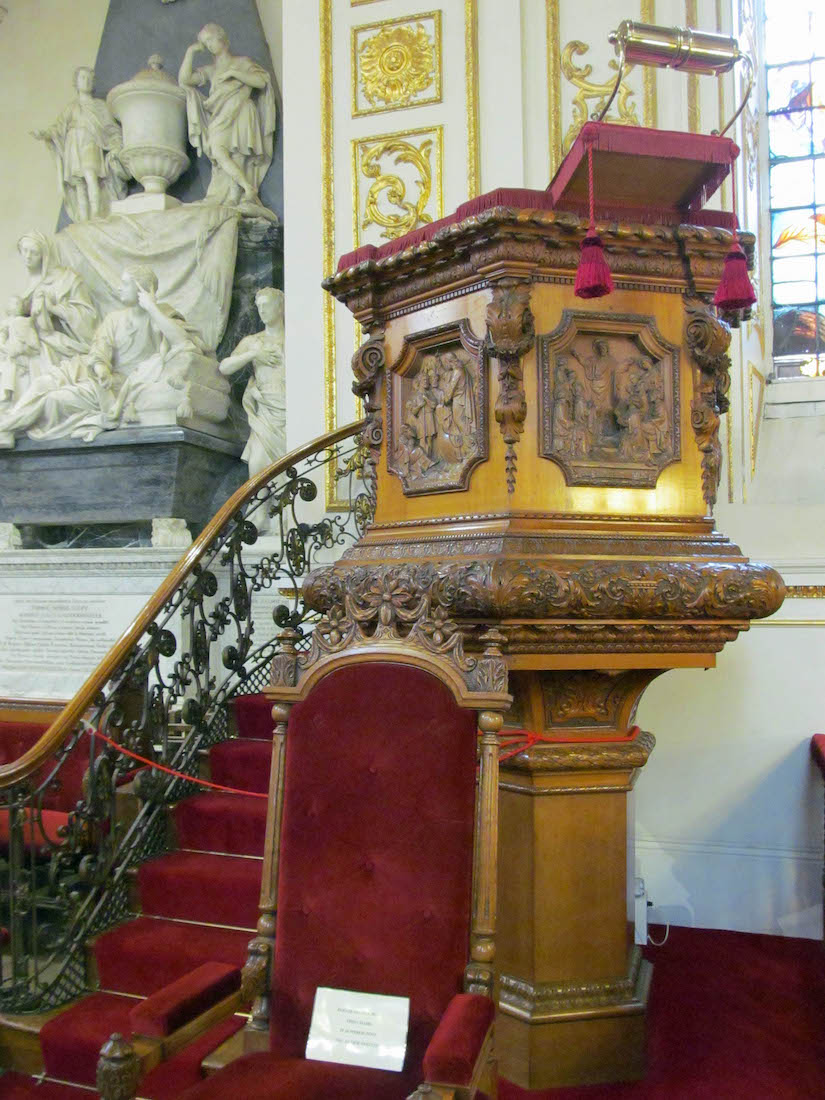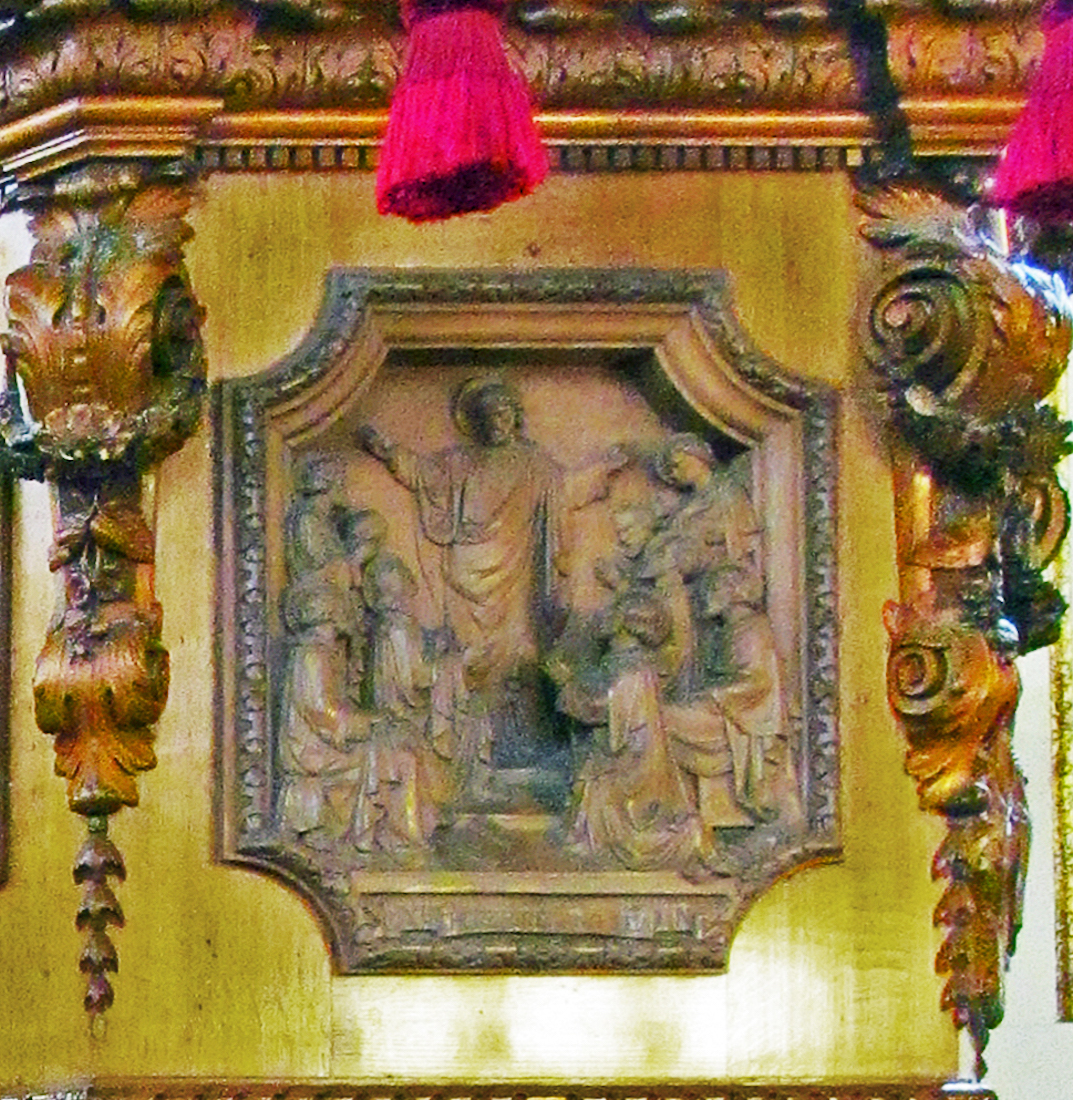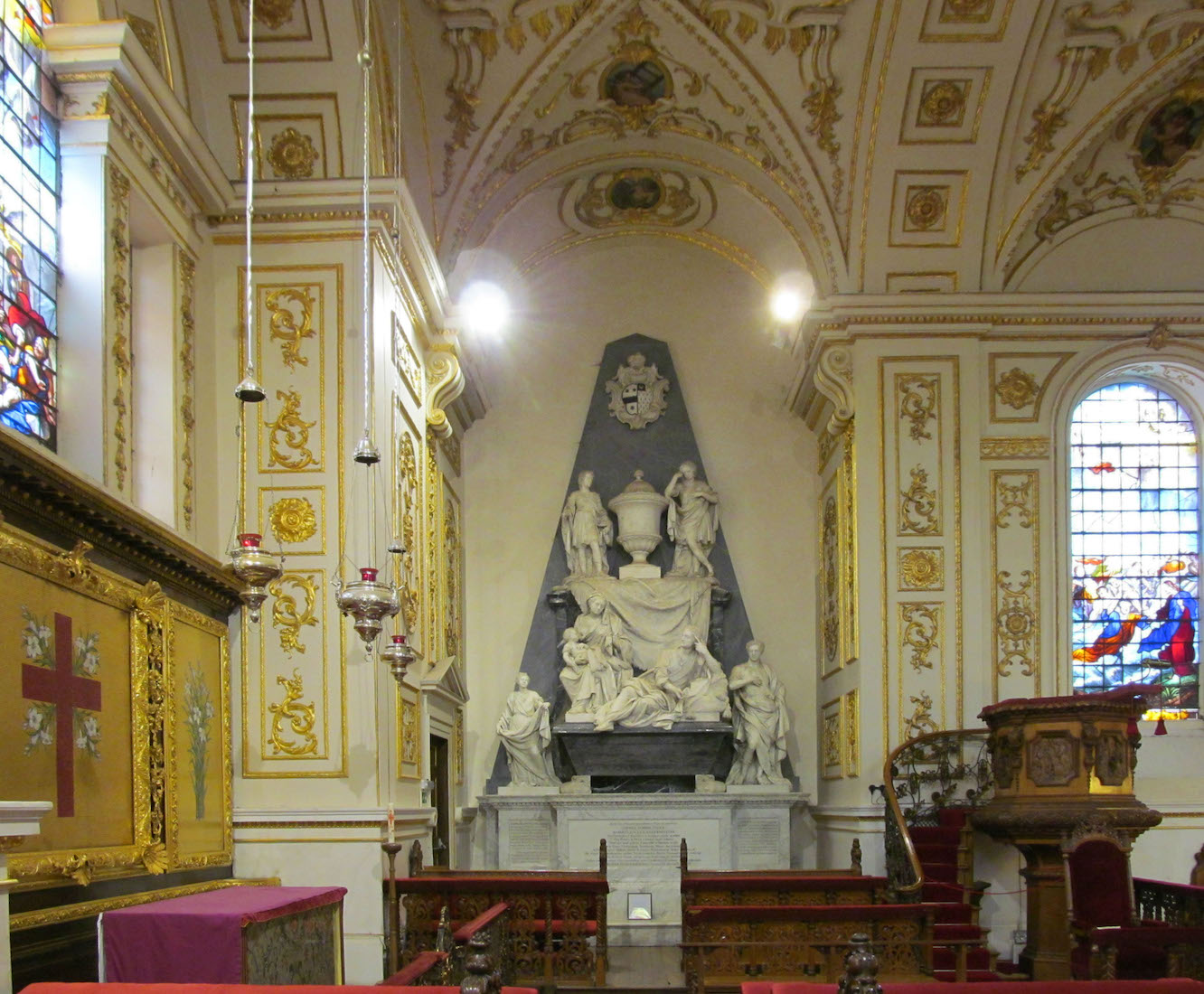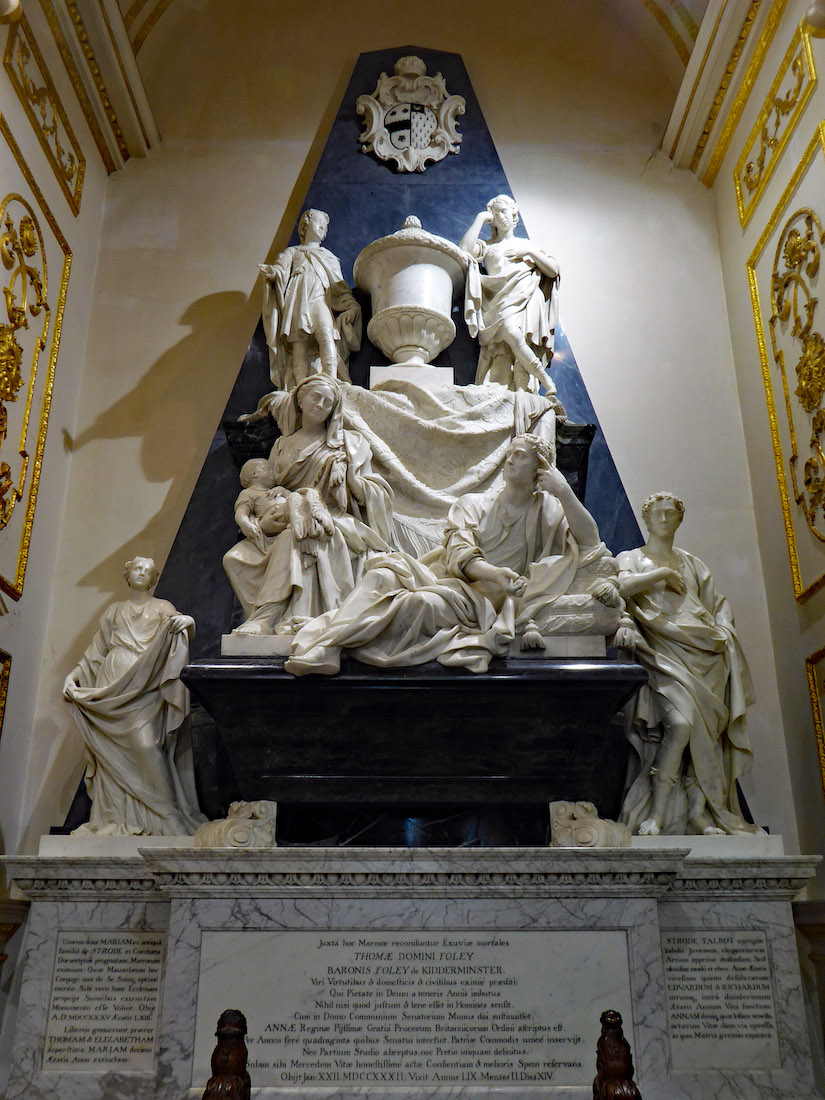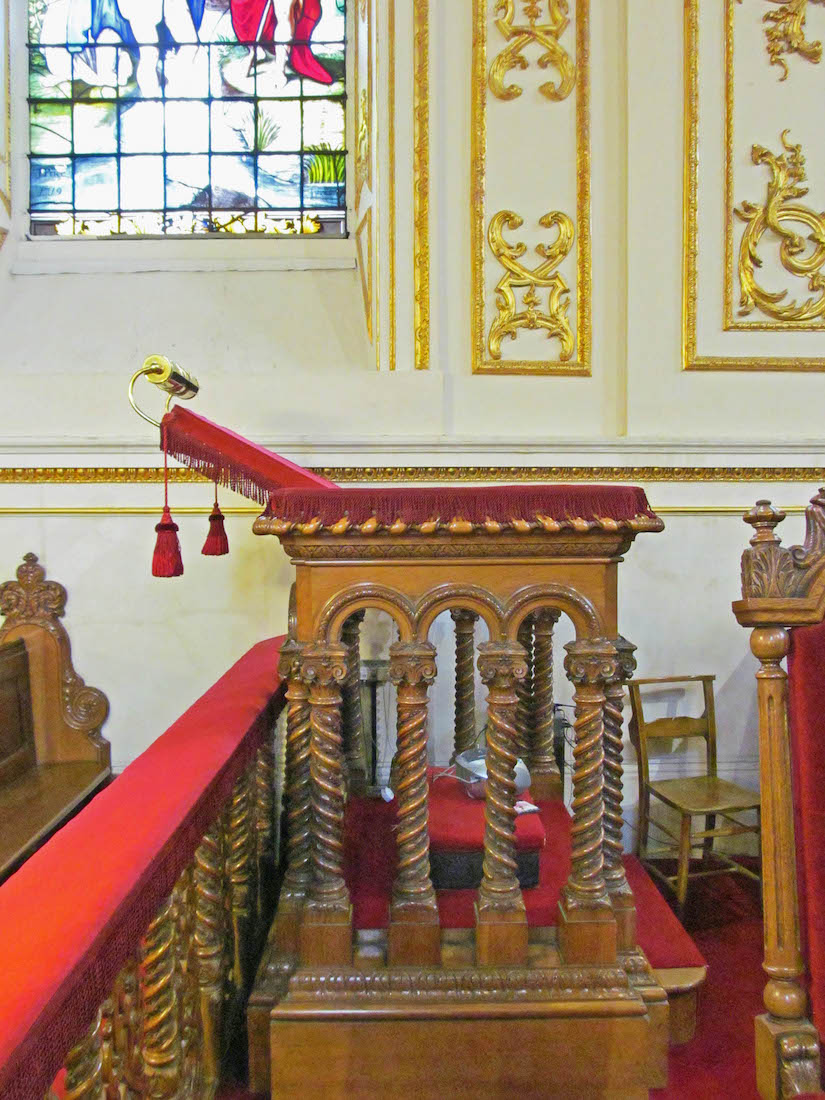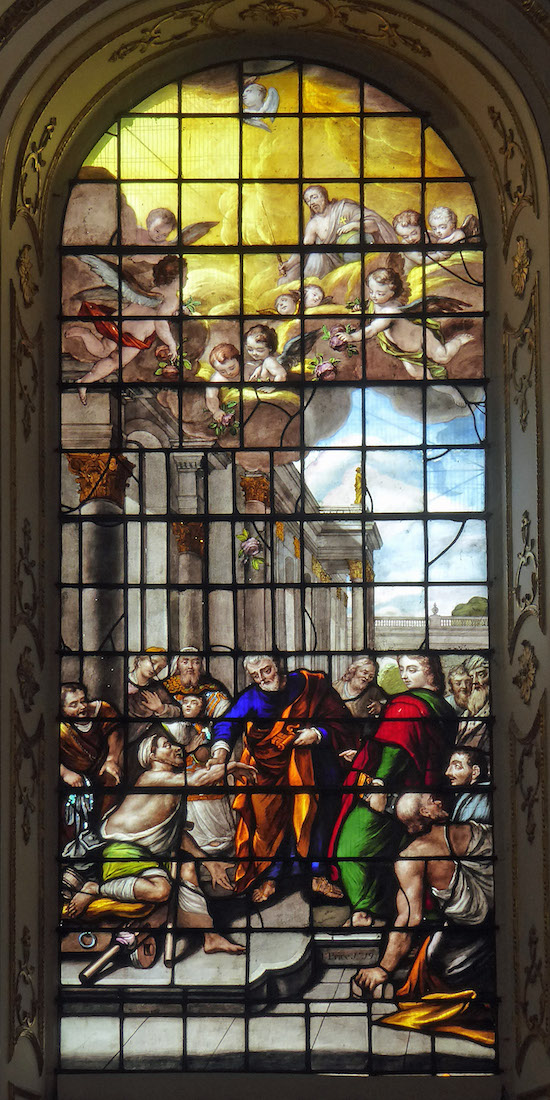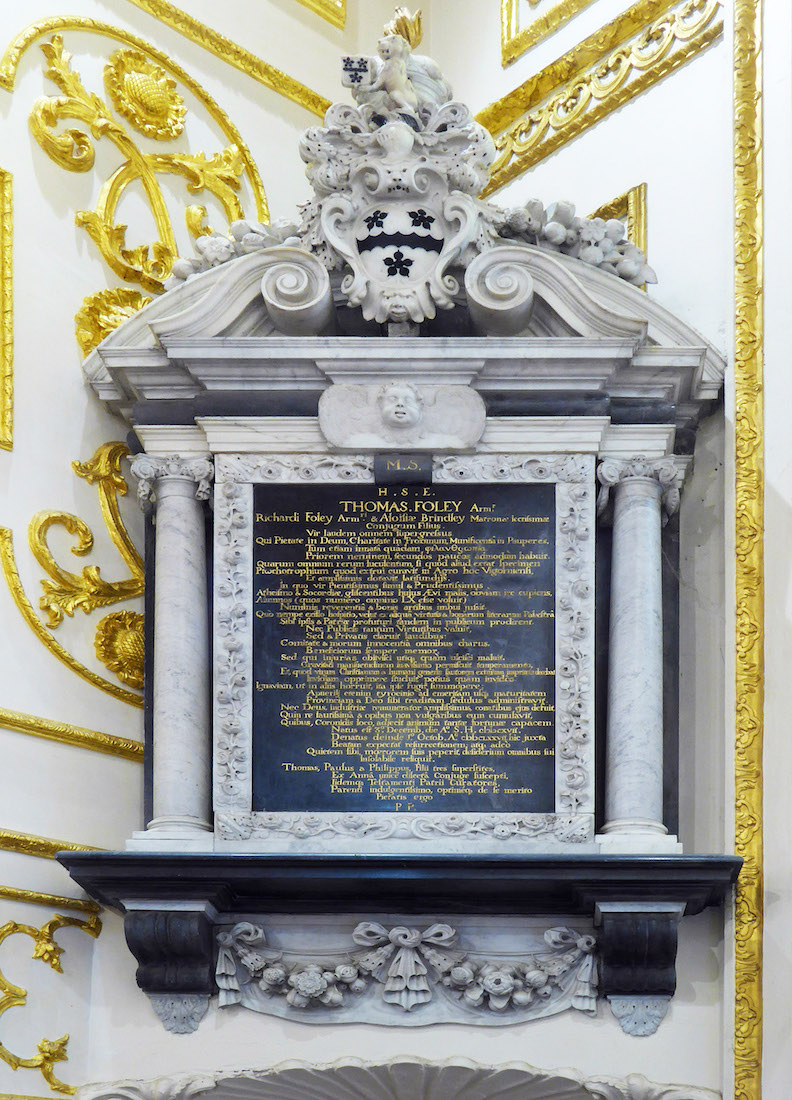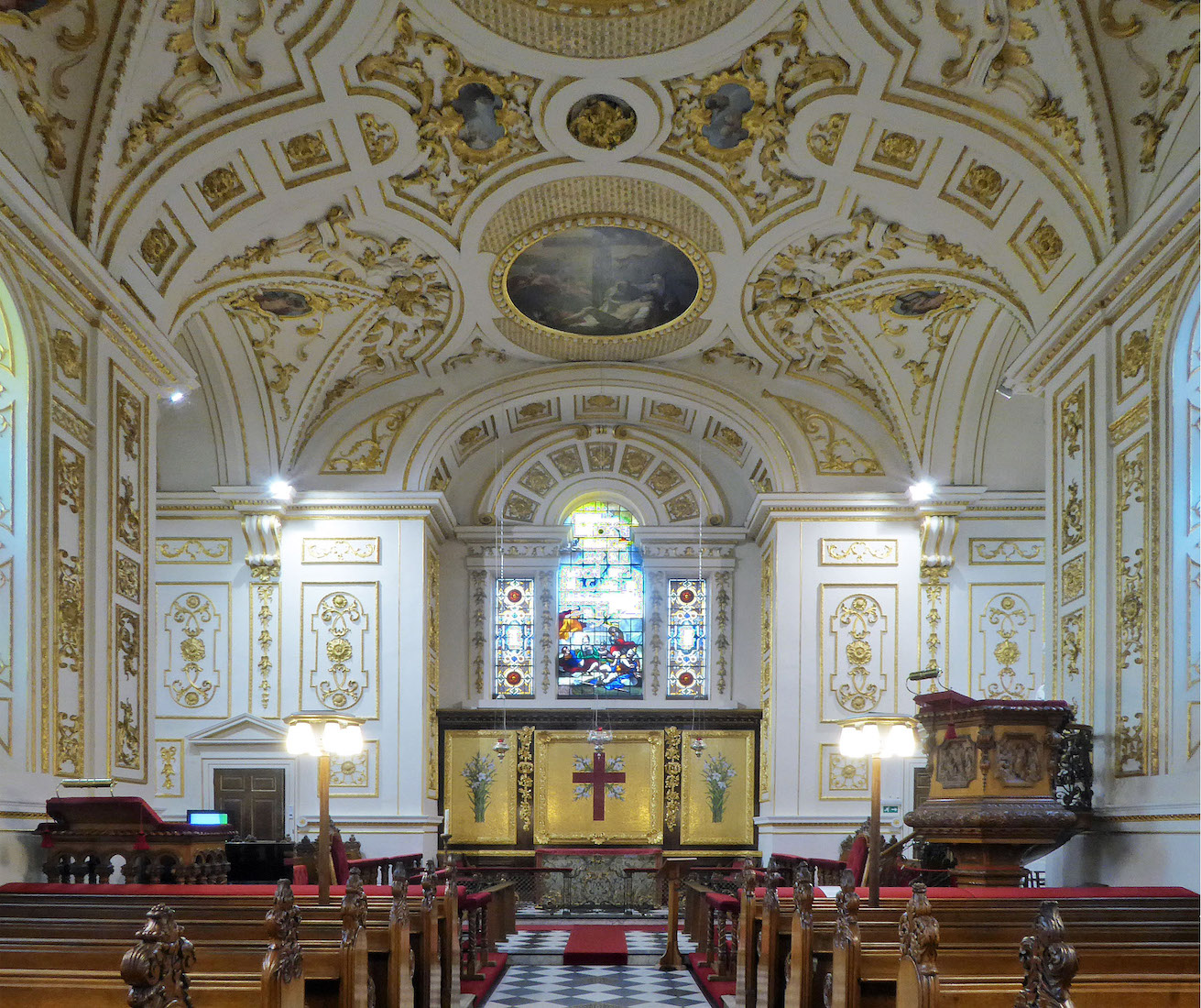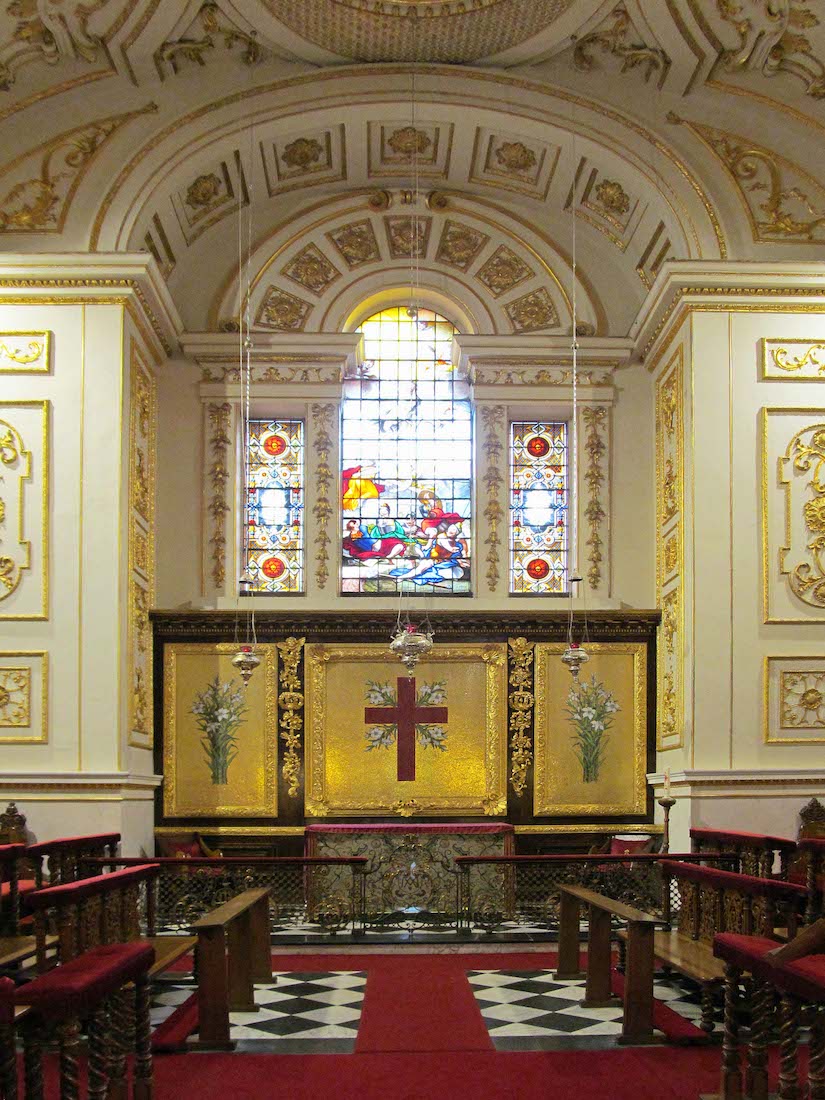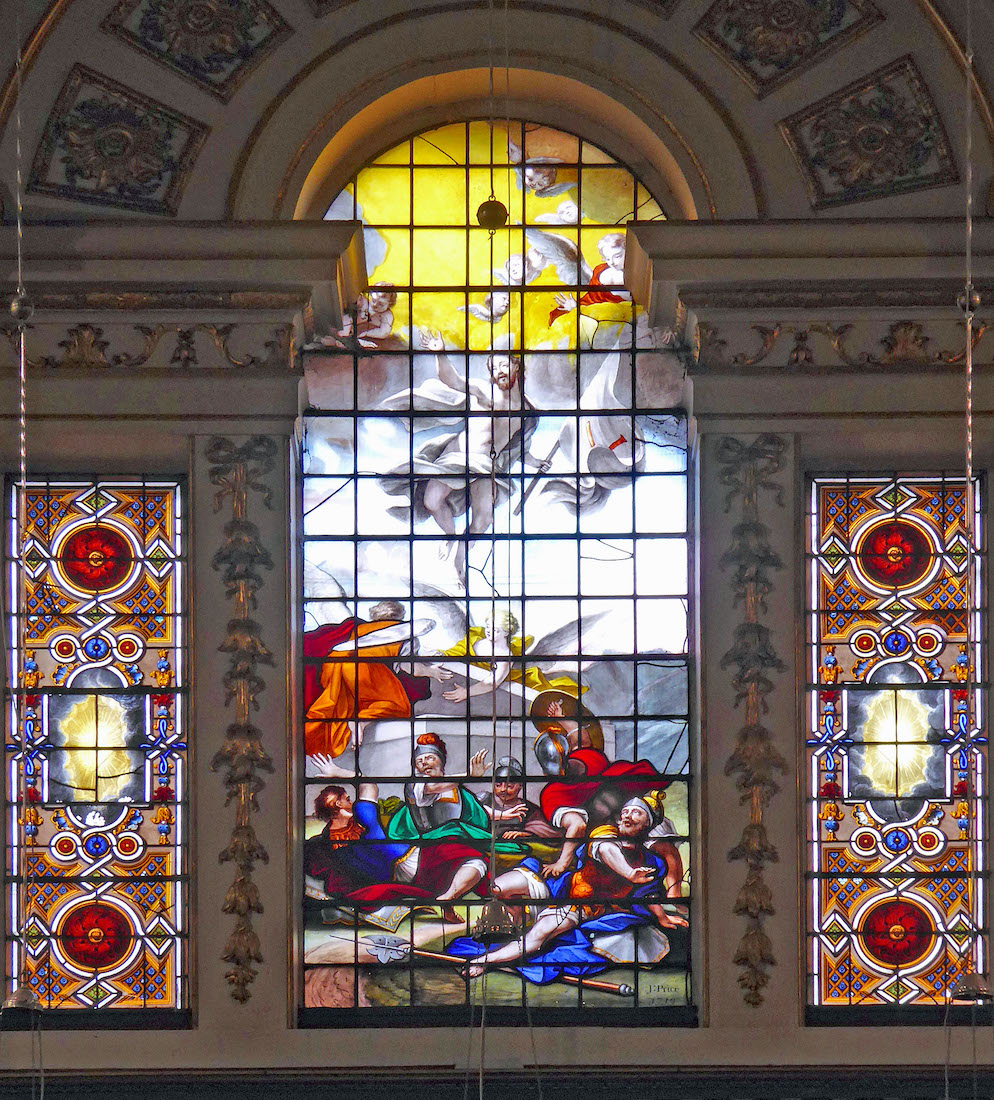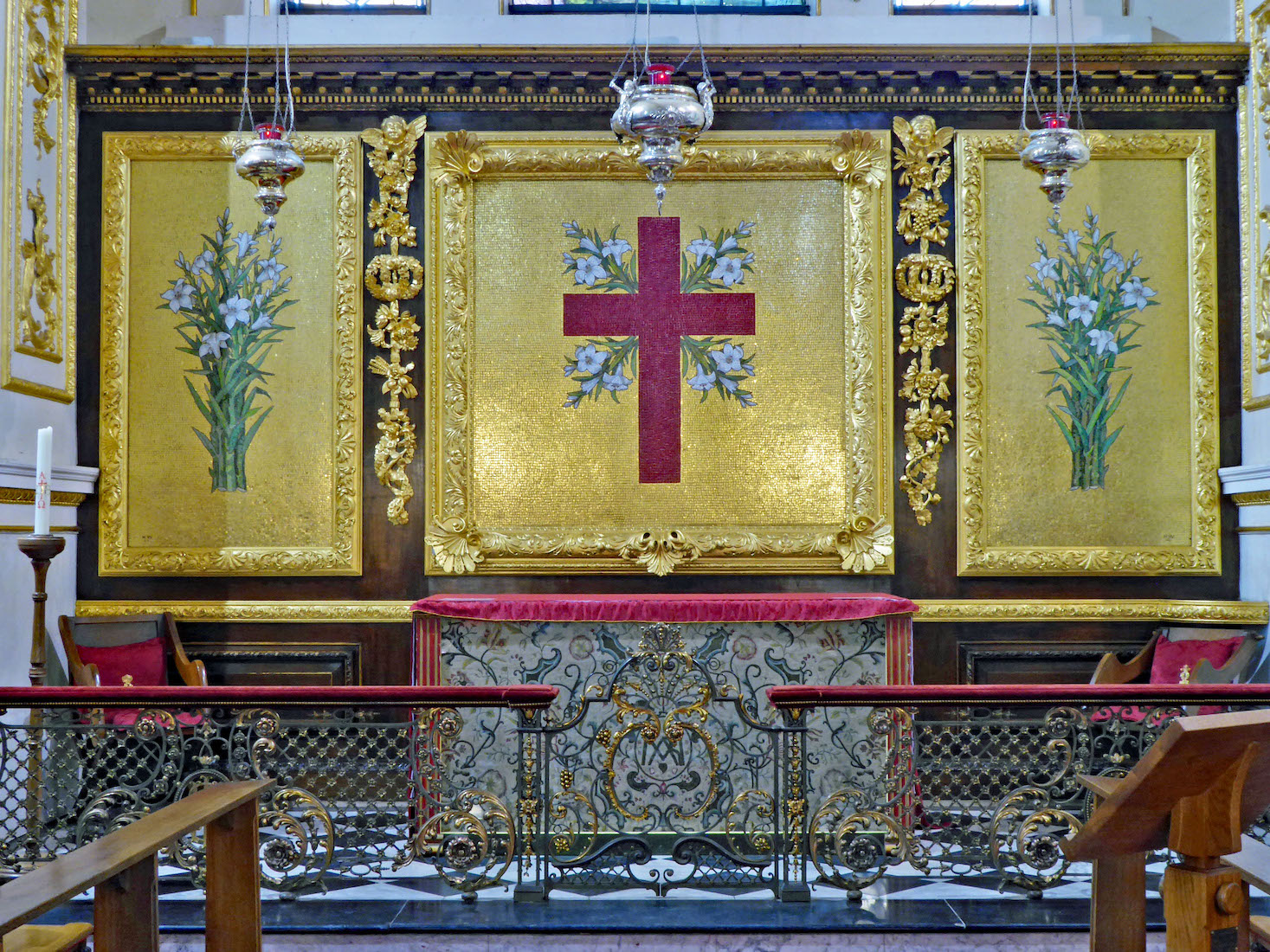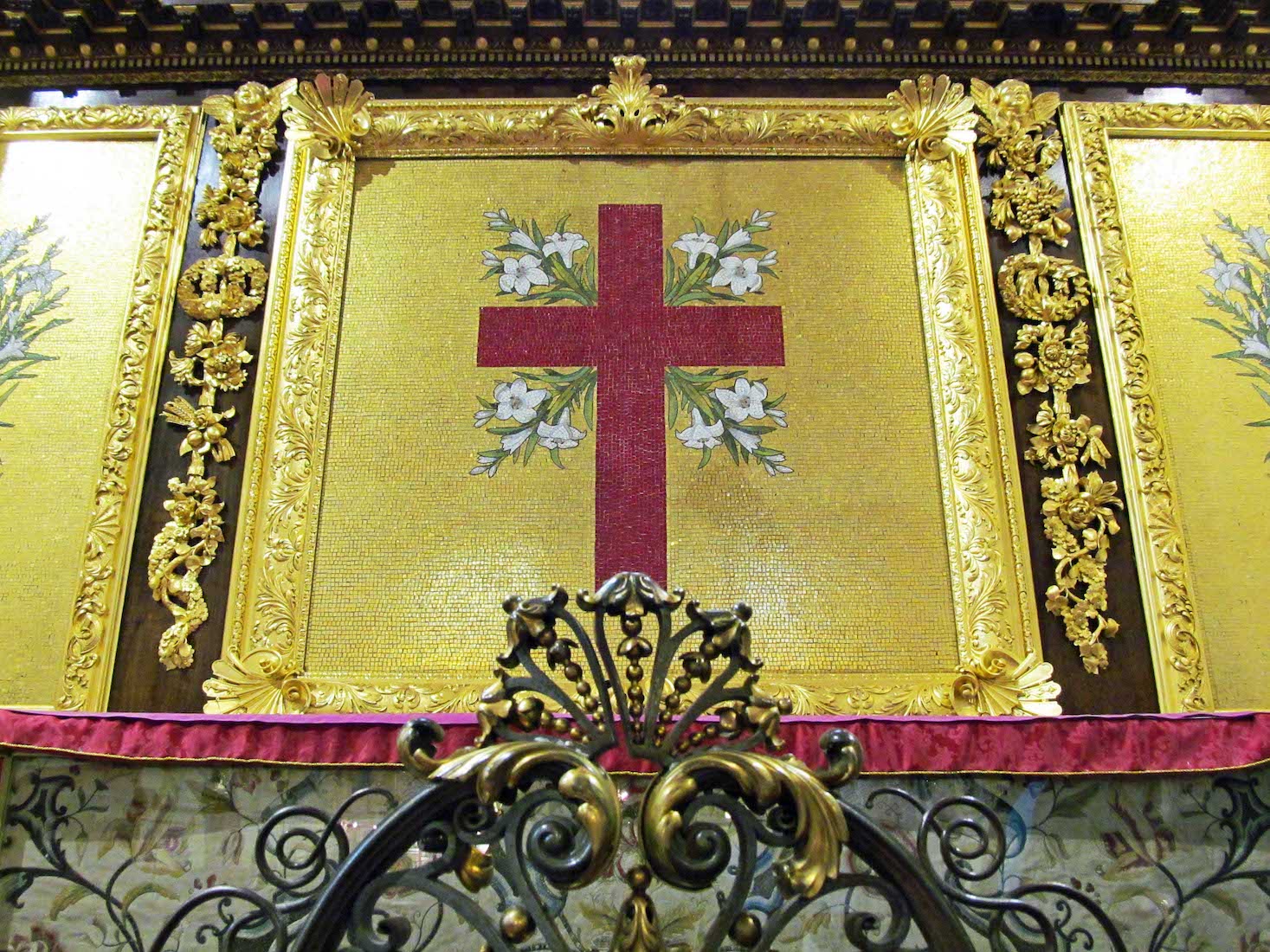21. CENTRAL CEILING AMT WH
The central painting depicts The Ascension. The ceiling paintings and organ were obtained from the estate of the Duke of Chandos. The paintings are outstanding. They were placed on a new purpose-built curved ceiling. INDEX
22. CEILING ROUNDELS AMT AMT
The large round painting nearest the organ shows the Nativity, with a shepherd coming to worship the baby Jesus. The corresponding painting to the East shows the Descent from the Cross. Here are some more ceiling details.
23. NORTH WALL WH AMT
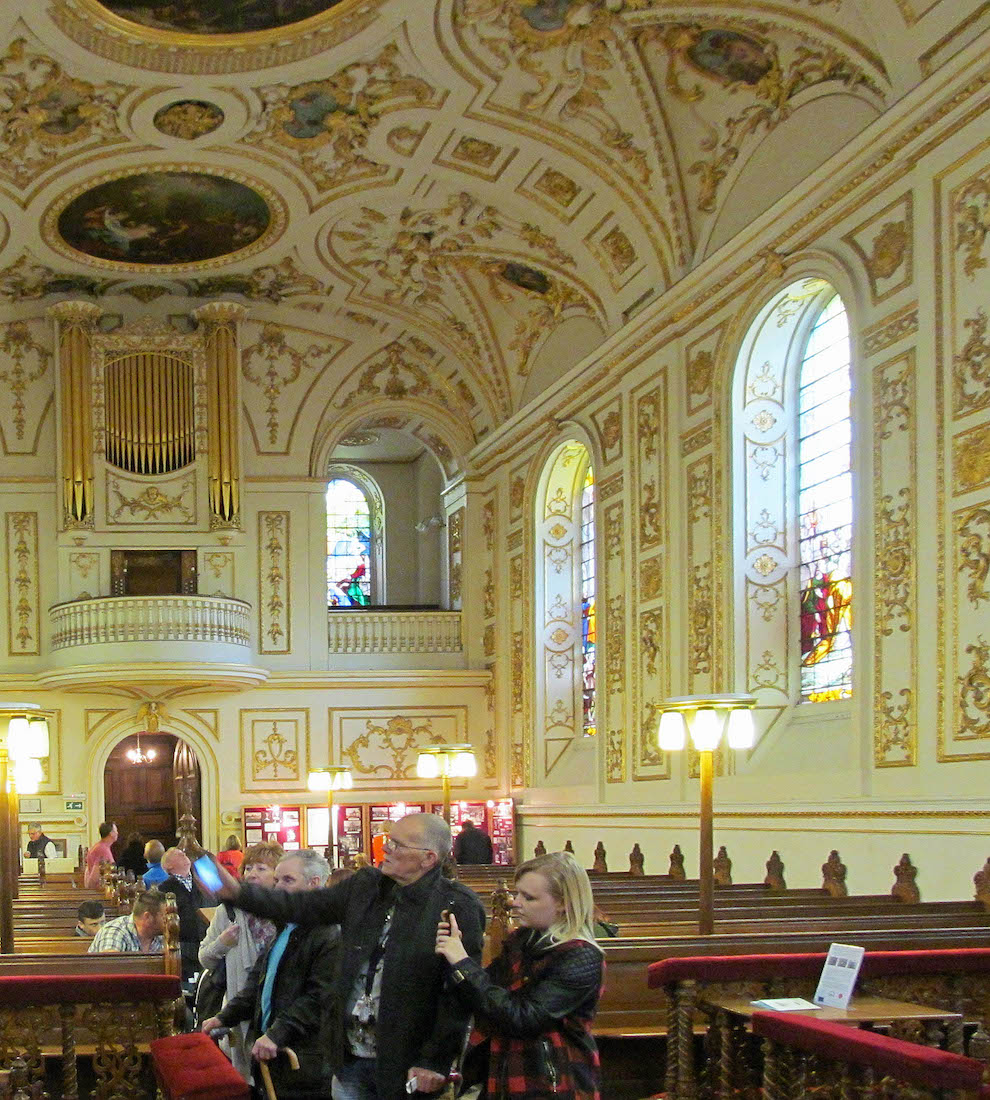
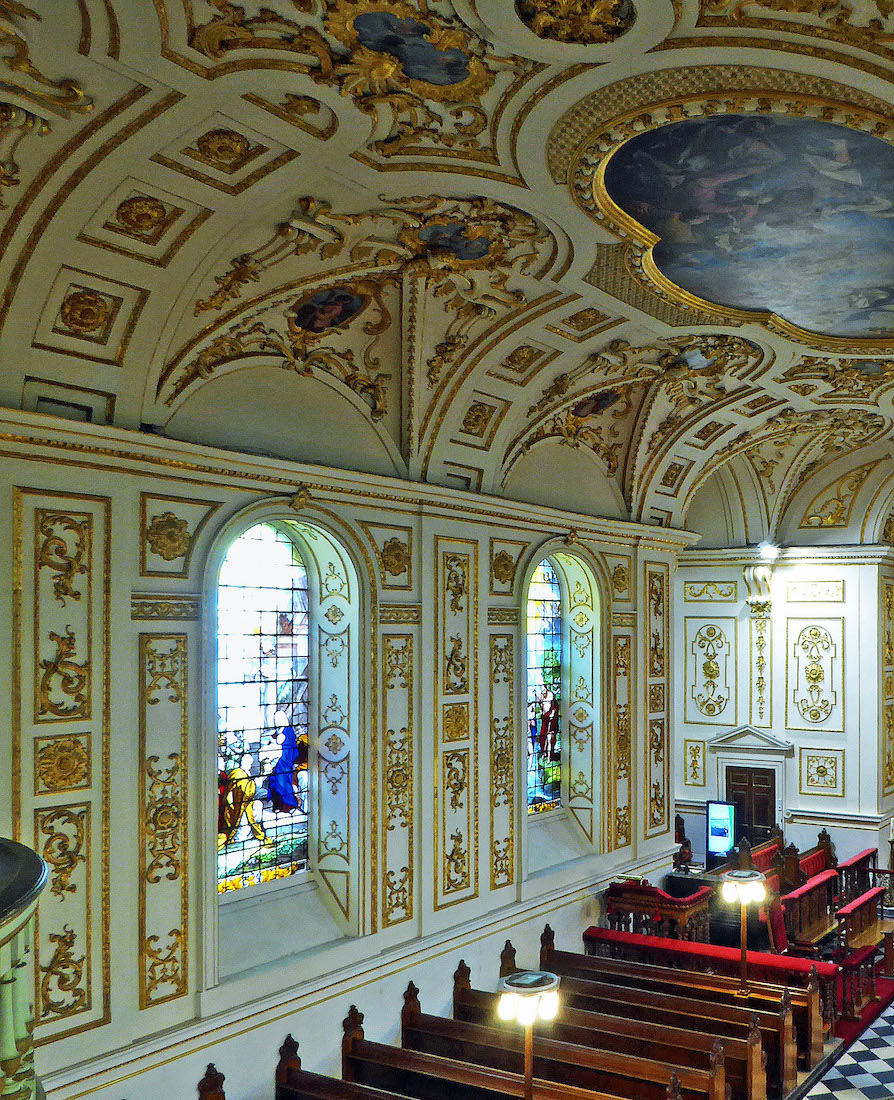
Here are two views of the North wall: one looking up, and the other looking down. There are three large colourful windows in this wall. For the gold decoration, note the large rectangles on the Eastern wall, and the central strips between the windows ... .
24. WALL DECORATION AMT AMT
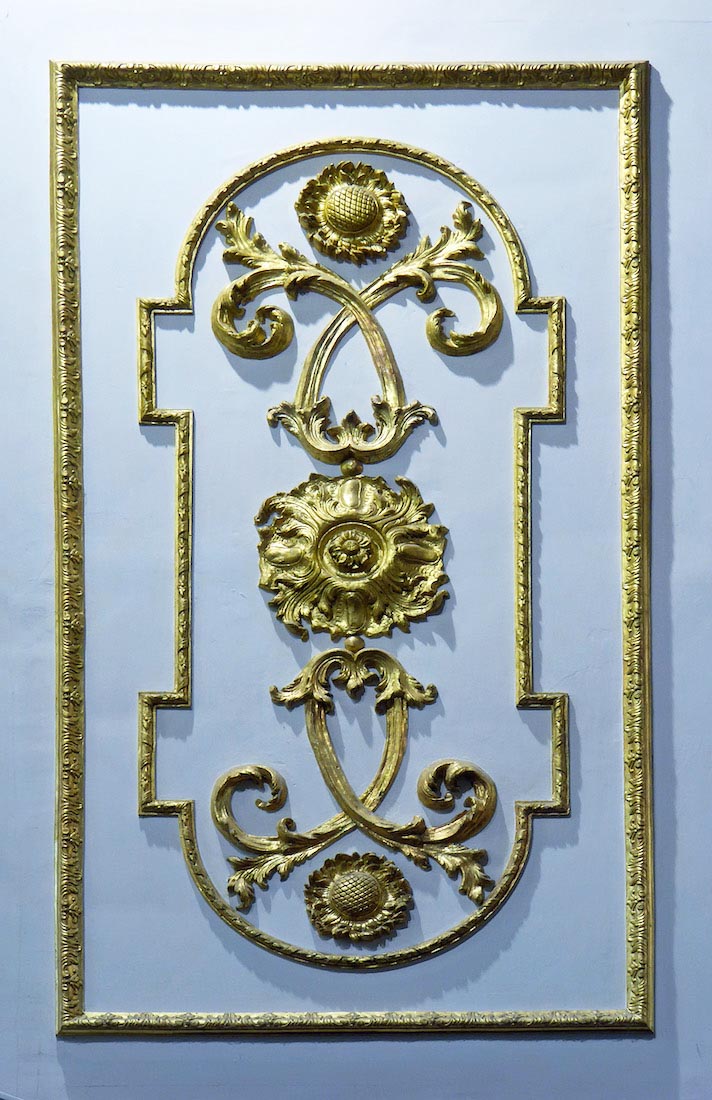
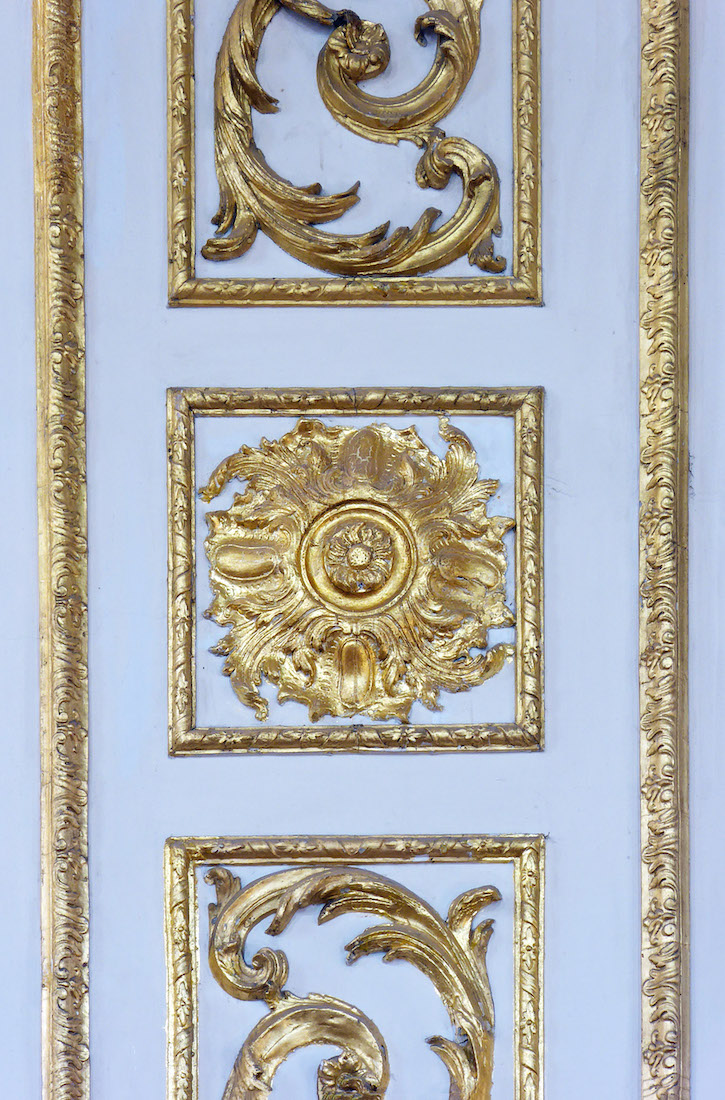
The moulds for the wall and ceiling decorations were taken from the original designs of the plasterwork at Canons and recreated from papier mache. Papier mache had just been perfected by Henry Clay of Birmingham.
25. NORTH WINDOWS AMT AMT AMT
The striking North windows show (from left): • The Visitation, when Mary goes to visit her cousin Elizabeth; • Adoration of the Magi; • the Baptism of Christ. If we look carefully at these windows we can see in each the mark of the artist, J. Price.
26. TO THE SOUTH WALL AMT
We now turn our attention to the South side, where beyond the pulpit are three more colourful windows.
27. SOUTH WINDOWS AMT AMT AMT
These South windows show (from the left); • Christ saving Peter; • Adoration of the Shepherds; • the Annunciation, where the angel Gabriel tells Mary of the forthcoming birth of Christ. If you would like to explore (and enjoy!) some of the window details in this Church, tap / click here.
28. PULPIT WH WH
The pulpit is Victorian but in Baroque style. It was mostly carved by William Forsyth of Worcester (1834-1915), but reused an eighteenth century wrought-iron stair railing.
29. SOUTHEAST TRANSEPT WH
As noted earlier, there is a very shallow transept at the East end of the Church. It contains one of the largest church monuments in the country (quite possibly the tallest) – the memorial to Thomas Lord Foley (d.1733) by the renowned Baroque sculptor John Michael Rysbrack. The monument dates from 1737. There is an exit door at the left, but no window above.
30. FOLEY MONUMENT AMT
The 26ft high composition in white marble depicts a reclining Lord Foley with his wife Mary and five of their seven children. It was erected in 1737 at the cost of £2000, an astronomical sum in those days. Details of the monument can be seen here.
31. LECTERN AND NORTH TRANSEPT WINDOW WH AMT
On the other (north) side of the Church stands the lectern. This dates from the same period as the carved pews and pulpit, and is made from English oak of the estate. The North transept also has a large window which shows St Peter healing the lame.
32. FOLEY MEMORIAL AMT
Also in the North transept, in the Northwest corner, is this much smaller memorial to Thomas Foley.
33. EAST END AMT
We are nearing the end of our tour of this lovely Church, so let us stand back and look at the East wall. In the foreground we can admire the carved ends of the pews. The door at left would have led through to the link to the old manor house. And at centre is the altar, reredos and East window.
34. ALTAR SETTING WH
The Cross is central to the reredos, but there is also the strong theme of the Easter lilies. There are several theories about Christian symbolism surrounding the Easter lily. Often referred to as ‘white-robed apostles of hope’, their color symbolizes the purity of Christ, who was free from sin. In many paintings, the angel Gabriel is depicted as handing Mary white lilies, which symbolizes her purity as well. The trumpet shape of the Easter lily represents a trumpet sounding the message that Jesus has risen, and the nature in which lilies grow is symbolic of the resurrection as well. From ugly bulbs that are underground for three years or longer, they become beautiful flowers. This process is reminiscent of Jesus's brutal death and holy resurrection. Thus, lilies represent rebirth and hope, just as the resurrection does in the Christian faith.
35. EAST WINDOW AMT
The central panel of the East window is called Resurrection. It shows the open tomb, the soldiers in disarray, and the Risen Lord. On either side is a decorative side panel.
36. ALTAR WH
The mosaic panels of the reredos were designed by Lady Rachel, second Countess of Dudley and made by Salviati in Venice in 1913. The wooden tresses between the panels are original and are in the style of Grinling Gibbons the 17th C wood carver. The altar frontal cloth is very fine embroidery from the early 18th century and was brought from Italy by Lady Dudley, as were the silver sanctuary lamps. The wrought iron fence and gate are also very distinctive.
37. ALTAR CROSS
This completes our tour of St Michael and All Angels Church. It is easy to get caught up in all the decoration of this Church so as we leave we fix our eyes on the Cross which speaks to us of Christ, the Author and Finisher of our faith (Hebrews 12:2).
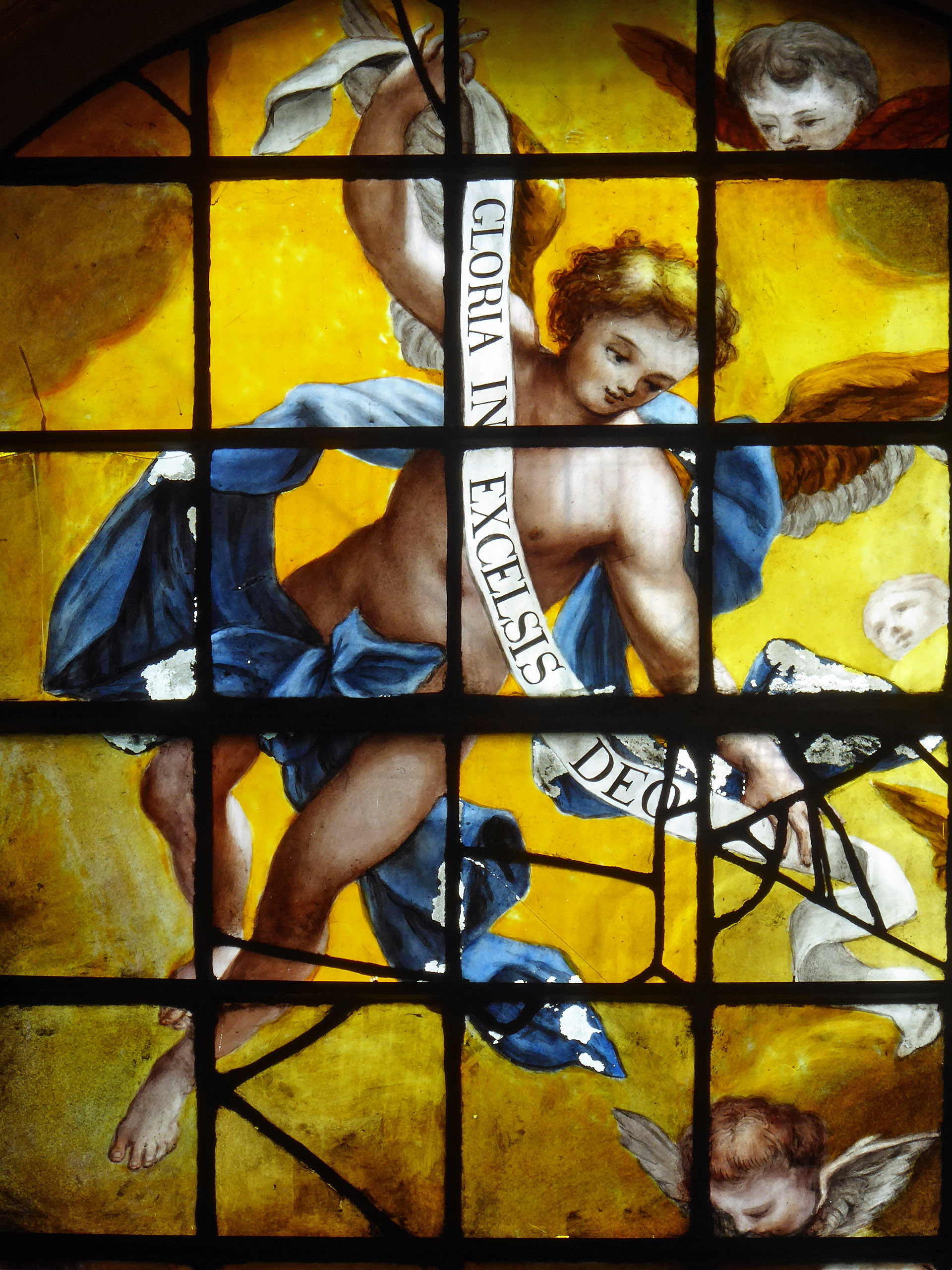
CONCLUSION
I hope you have enjoyed our visit to this Church of St Michael and All Angels. What an extraordinary church it is!
As mentioned earlier, almost all of the photographs which appear here, are by Aidan McRae Thomson and Wendy Harris, and I continue to be very grateful to them for their support of this project.
The originals of Aidan’s photographs can be found at:
https://www.flickr.com/photos/amthomson/sets/72157702008338431/
The originals of Wendy’s photographs can be found at:
https://www.flickr.com/photos/pefkosmad/albums/72157653548256736
It has also been my pleasure to have the cooperation of others in supplying single photographs. These are:
#4 ‘Tedesco57’ : https://www.flickr.com/photos/tedesco57/17136557421
#4, #6 ‘Jacquemart’ : https://www.flickr.com/photos/26602223@N00/17319838336
#13 Rob Cocklin : http://the forsythbrothers.com
I take little credit for the text which comes from a variety of different sources.
I also express my thanks to my wife Margie who dutifully reads through all my websites and checks the typing.
There is a website for the St Michael and All Angels Church, with link:
https://www.greatwitleychurch.org.uk
Site created 06 / 2021
Paul Scott

